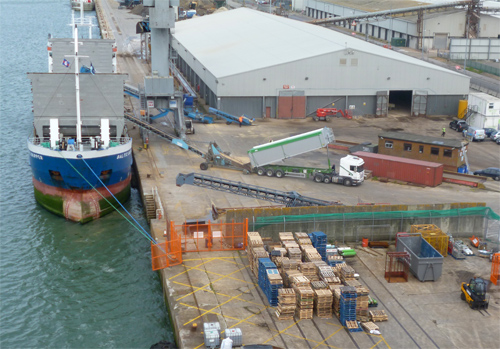 |
|
The Latest Freight Technologies
The freight industry is one of the sectors that have seen massive technological revolutions in the recent past. And as expected, traders are keen to adopt measures that are not only time-efficient but also those that save on the overall operational cost.
This enables them to get as much goods as possible to their intended destination without incurring more expenses than they should. However, it is important to mention that technology also comes with its fair share of challenges so it is going to be a tough balancing act between embracing the latest freight technology and postponing it just a little longer. The following are just some of these technologies.

1. Electronic Logging Devices
An electronic logging device is an in-cab device designed to record critical data on the status of a freight vessel at any given point in time. It especially records the movement of the vehicle and the status of the driver.
The device is primarily used to monitor the security of the driver as well as ensure the vehicle is not used for any purpose other than the intended one and does not deviate from the intended routes without a valid reason for doing so.
2. Stricter Measures On The Hours of Service
Hours of service basically refers to the driving hours of a truck driver. According to the Great Britain Domestic Rules, there will be stricter measures on the HOS requirements that shall include but not limited to restricting the driving limit to 10 hours a day on a public road or off-road in case the driver is not driving duty time, estricting the daily duty limit to 11 hours in any working day provided you drive on the said day and recording your hours on a tachograph or a weekly record sheet.
3. Tremendous Growth in E-Commerce
Online shopping has become the spur in most parts of the world. And while many will admit it is faster and sometimes cheaper than shopping from physical stores, the freight industry is not smiling at this internet revolution. The supply chain has been affected because logistics companies will now have to optimise the existing chains to ensure they still remain relevant in the freight business.
And to paint a clearer picture, a logistics company that previously offered services from a postal office to residential homes and offices has now been rendered insignificant as most e-commerce shops now offer home deliveries for goods purchased from their online stores. The logistical companies now have to work out a plan of ensuring they retain some stake in offering last mile delivery services which means they still have to do so at the mercies of these e-commerce companies.
4. Green Transport Solutions
Over the years, global warming has risen to become one of the greatest scourges of modernity and the freight industry has not been spared either. Uncontrolled emissions of hazardous gases have been one of the hallmarks of this industry. And in order to join in the fight to protect planet earth, industry experts have come up with solutions that will ensure this industry contributes more to conserving as opposed to polluting the environment.
A case in point is the renewal of interest in The Trans-Siberian Railway as a better alternative than air transport. The argument is pretty simple; rail transport handles much more than air and road transport combined and the fewer the freight vessels, the less the emission of harmful gases such as carbon dioxide so the overall winner is Mother Nature.
5. Application Program Interfaces Will Revolutionise Pricing Mechanisms
The introduction of Application Program Interfaces will greatly influence pricing among freight shipping providers and enable them keep their rates lower.
According to FleetOwner, what API does is that all data exchanges between the various players in the industry such as shippers, carriers, receivers, freight brokers as well as transportation management systems will be automated so as to ease tracking and facilitate accountability. This will ensure easier selection of personnel and adjustment of rates across the board.
6. Introduction of Robotics And Virtual Reality Through The IoT
Virtual Reality has already made its impact in various sectors and its introduction into the freight industry will no doubt cause a massive transformation in terms of speed, efficiency and quality assurance. Robotics will ensure automatic picking and packing which will in effect reduce labor and transportation costs.
The introduction of the Internet of Things in the freight industry will also make it possible for companies to monitor weather conditions, possible communication breaches among various departments and avert any possible cyber security threats.
7. A Paradigm Shift From Classroom-Based To Field-Based Education
It is now clear that the new-wave freight workers will require more than classroom-based education to cope up with the demands of the industry. Computer programming skills, intricate mathematical skills and understanding of the concepts of robotics will become a prerequisite for those looking for employment in the freight industry.
No company would agree to the idea of subjecting their recruits to additional training programs so it will be incumbent upon colleges and universities to ensure that freight-oriented courses are more focused on the actual situation on the ground as opposed to mere theories and academics.
8. Self-Driving Trucks
Self-driving trucks is also a great technological revolution in the freight industry and as already mentioned, it is part of the wider initiative to have the entire supply chain automated. Aside from the obvious advantage of helping reduce labor costs, this technology will also be useful in reducing the instances of human collateral in the event of an accident.
If no human life is lost, then this is good news for the company as it means no agonizing legal battles and certainly no restitution for the bereaved families, [which again takes us back to cost-saving initiatives].
9. Foldable Containers
Last but not least, this technology will no doubt inspire more people to invest in the freight industry. The idea behind it is that empty containers can be collapsed and crammed into one place so that they leave room for the loaded ones to be ferried with ease. According to Staxxon, the containers are vertically folded by collapsing their doors and pushing their outer walls into each other. If done correctly, about 5 empty containers can fit into the space of a normal one. There can never be a better space-saving initiative than this one.
Return to Articles page.



Freight Wales | cardiff | bristol | Swansea | Newport | Locations| News | Types | Events | Articles | T & Cs | Privacy
Bristol Office: RSJ International Freight Company, Unit 16, Londonderry Farm, Keynsham Road, Willsbridge, Bristol, BS30 6EL. England. Telephone: +44 - 0117 932 1160 - VAT NO: EORI Vat No GB862897370000 - © 2005 - 2023.
Wales Office: RSJ International Freight Wales Ltd,
Unit C10,
Treforest Ind Estate,
Pontypridd,
CF37 5UD. Tel: 01443 842822